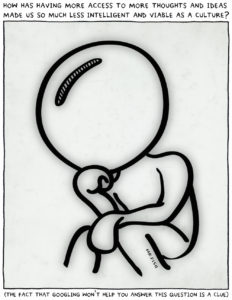Scott Ritter on War With Iran
The Truthdig columnist (and WMD expert) warns that war with Iran could be inevitable, despite the National Intelligence Estimate report that says Iran dismantled its nuclear program in 2003. Bush, Ritter argues, doesn't let facts get in the way of what he wants.
The Truthdig columnist (and WMD expert) warns that war with Iran could be inevitable, despite the National Intelligence Estimate report that says Iran dismantled its nuclear program in 2003. Bush, Ritter argues, doesn’t let facts get in the way of what he wants.
Listen to this interview.
Transcript:
James Harris:
This is Truthdig. James Harris sitting down with Scott Ritter, former chief weapons inspector in Iraq. And today we’re talking about the latest report from the National Intelligence Estimate. The report says that Iran is not, as of mid-July, in the nuclear weapons business. Scott Ritter — I think, wisely — told me to look at this report with caution and that this means nothing to the White House, that they [members of the Bush team] are about regime change. Please explain.
Scott Ritter: Well, I think it’s important to assess patterns of behavior. When we take a look at the Bush administration and how it has sought to implement its policies of regional transformation in the Middle East, inclusive, these policies include the notion of regime change, removing unpopular regimes, regimes that the United States unilaterally declares incompatible with its vision, removing them from power. This includes Saddam Hussein and the theocracy in Tehran. They have demonstrated a tendency to exaggerate threats in the form of weapons of mass destruction to exploit the ignorance of the American public and the fear that is derived from this ignorance. They did so with Iraq. They made a case for war based upon weapons of mass destruction that they fail to back up with anything other than rhetoric. I can say, as a former weapons inspector who ran the intelligence programs from ’91 to ’98, that we had fundamentally disarmed Iraq, so for the president to say that there’s this new weapons capability, he would have to demonstrate some new information, and he failed to do so. And that’s why I said, unless he provides this new data, that there isn’t the WMD threat that he said. The same thing can be said about Iran.
Harris: Why should we be cautious about what President Bush is telling us right now?
Ritter: Here’s a president who has said Iran is a threat, a threat in the form of a nuclear weapons program. But for some time now I have been saying, “Where’s the beef, Mr. President? …”
Harris: Hmm.
Ritter: ” … I hear the rhetoric, but your pattern of behavior leads me to believe that you might be exaggerating the threat, fabricating the threat, misrepresenting data to achieve your policy objective of regime change, trying to exploit the ignorance of the American public and the fear derived from this ignorance.” Now we have a National Intelligence Estimate that is released that says, “Time out. There hasn’t been a nuclear weapons program in Iran since 2003.” Now I need to make a point here: I continue to say that there’s never been a nuclear weapons program in Iran. And the National Intelligence Estimate doesn’t provide any evidence to sustain its assertion that there was a nuclear program. But be that as it may, they’re saying that the concept of Iran today pursuing nuclear weapons is a fallacy. There’s no data to promote this. Now, if we lived in world where government functioned the way it’s supposed to when it comes to policy — that is, you get your intelligence, you look at it, you examine it, you assess it, and you say, “OK, how do we now interact with the target, the nation, in this case, Iran?” — that’s normal. That’s cause-and-effect relationship.
Harris: Sure.
Ritter: But what we have is, the administration has already made up its mind about what it wants to do with Iran and had been fabricating a case based upon a nuclear weapons program that the U.S. intelligence community now says doesn’t exist today. Do you think there will be a change in policy? And the answer, of course, is no, because they’ve got the cart before the horse. They put the policy out in front. Inconveniently, the intelligence community didn’t back them on the nuclear weapons issue. …
Harris: But you say Iran’s status as a terrorist organization also plays into this. How so?
Ritter: Not only does the Bush administration continue to say that Iran is a terrorist state, that it supports terrorists who were directly or indirectly involved in the events of Sept. 11, 2001. The United States Senate has passed a resolution that says the same thing and certifies the Iranian Revolutionary Guard command is a terrorist organization. So anybody who thinks for a second this National Intelligence Estimate somehow retards the ability of the Bush administration to engage in military action against Iran, you’re sadly mistaken. The Bush administration’s policy has been made. This estimate was not used to make that policy, and as you yourself have reflected, the president’s not going to let this estimate get in the way of his continuing to articulate Iran as a threat.
Harris: Well, Scott, if you’re right, that’s a high crime. That’s wanton disregard for American wishes, disregard for any of the national intelligence agencies that supposedly cover our back.
Ritter: It’s wanton disregard for everything we stand for as a nation. We elect representatives to government to do our bidding. We expect them to operate within a framework of due process set forth by the rule of law. We might call this the Constitution or laws derived from the Constitution. We speak of checks and balances where we have three separate but equal branches of government, and when it comes to foreign policy and national security policy, really, two. The judiciary takes a step aside and it becomes the executive and the legislative branch. And there’s a system, a bureaucratic system there — the State Department, the CIA, the Defense Department — that is supposed to weigh in on these issues. And like I said, you want to gather the facts, examine the reality, and then make the policy. What we have here is an administration that, ideologically, has committed itself to certain policy actions divorced from what we’ll call reality, early on in the Bush administration.Harris: Hmm.
Ritter: We heard people speak of a new reality, that the Bush administration can make its own reality. I’m not joking. Paul O’Neill, former secretary of the Treasury, who sat in Cabinet meetings where this was said. And so we now take a look at a situation where the president and his administration are continuing to march forward on a policy direction, regardless of what the data says. Am I jaded? No. I’m alarmed, as much as you are, but I think it’s imperative that we address this responsibly by first realistically acknowledging what’s occurring. There’s too many pundits out there today who are raising the flag of victory, saying, “Aha! Because of this NIE, this National Intelligence Estimate, war’s off the table. We don’t have to worry about it. The Bush plan has been undermined.” It most certainly hasn’t, because the Bush administration has never shown a tendency to respect the normal system of government. This estimate won’t have an impact at all.
Harris: Is it likely that George Bush will look at this report, throw it in the garbage and continue on, business as usual? The business, in this case: engage hostilely with Iran.
Ritter: The answer is yes. He is engaging hostilely with Iran. Remember: I’ve been saying for some time now that the Bush administration is taking the nuclear issue off the front burner. The CIA’s estimate follows on the heels of a finding by the International Atomic Energy Agency back in September that said the same thing: There’s no evidence of a nuclear weapons program. And this was one of their final analyses. They’ve been saying this for some time. The Bush administration has been, for many months now, having a hard time selling Iran’s nuclear threat as a causa bella. This is why they’ve shifted to terror and terrorism. The Bush administration is going to use the gift it was given by the U.S. Senate, this target list of the Iranian Revolutionary Guard command to serve as the cornerstone of its target list when it comes to launching a limited military operation against Iran that’ll probably take place some time in the spring. This is the plan, and the NIE — I don’t think — has changed this one iota. Now, it could. Let’s say Congress woke up all of a sudden. Let’s say Congress said, “Oh my goodness, this president’s been pulling our chain, been lying to us, hyping this thing up. There’s no threat,” and Congress intervenes in a way that it’s refused to do so to date, then maybe, maybe this war could be stopped. But if Congress continues to turn a blind eye or worse, as in the case of the Senate resolution, to facilitate Bush’s hyping of Iran as a threat, I think war is inevitable.
Harris: They’ve been asleep for five years now. Why would they wake up now? Why …
Ritter: [Unintelligible.]
Harris: Yeah. Hillary Clinton voted “yes.” She’s a U.S. senator, she’s running for president, and she said, “Yes, the Iranian Revolutionary Guard is indeed a terrorist organization.” Does this further the idea that “the Democrats and the Republicans — you know what? — they’re all in bed together”?
Ritter: It furthers the notion that front-runners are all in it together. The bottom line is, Hillary is getting money from the same sources that fund Giuliani. And if you take a look at their foreign policies, they’re pretty much one and the same. They’re very aggressive foreign policies. They’re based upon the premise of a unitary executive, that the president has the right to pre-emptively launch military strikes against threats that emerge, and maybe do so in a manner which negates Congress. There’s no difference between Hillary and George W. Bush or Rudy Giuliani when it comes to issues of this sort. There’s other Democrats out there who of course take a more nuanced, I would say responsible, point of view. Bill Richardson, governor of New Mexico, an outstanding candidate. But he’s not getting money from the same sources that are underwriting Hillary and Giuliani and others.
Harris: Scott, tell me what you think our president should be all about these days.
Ritter: The president should govern in accordance with the Constitution. What we have here is a situation that has existed for some time now where successive presidential administrations, frustrated by the inadequacies of democracy, so to speak — .
Harris: [Laughs.]
Ritter: It’s an ugly process. It takes time. It’s not convenient. And presidents want to wield their executive authority. And so, especially in time of war, they’ve created this concept — and it’s totally at odds with the Constitution — of the unitary executive where the president has unilateral powers in times of war. Somebody like Ron Paul, I think, somebody who knows the Constitution, takes a look at this notion of unitary executive authority and says, “Humbug. That’s ridiculous.” And I agree with him. I think it’s imperative that whoever becomes president understands that there are constitutional restrictions on what the president can and can’t do. I also think it’s imperative that Congress start reading the Constitution and flexing its constitutional muscles. That there is a role for Congress to play. It’s called oversight. And that Congress can retard irresponsible policy, that the president doesn’t get a blank check when it comes to foreign policy and national security policy. But, as you mentioned, we don’t have a Congress that seems to be enlightened in this fashion, and outside of a Ron Paul we don’t have too many people who have announced themselves as candidates for the president who will publicly commit to reversing this trend towards a unitary executive.Harris: Before we move on, what are you optimistic about as we close the year and some of us being to make resolutions? Having told us before, there are no weapons of mass destruction, having been vociferous about the fact that the Bush administration is not doing their job, what keeps you optimistic in all of this? How do you not become jaded? How do you not become disillusioned?
Ritter: I’m a student of history. I allow myself to go back and examine the history of the United States, and I recognize that throughout our history our nation has been faced with serious problems, and yet we overcame these problems. It wasn’t pretty, and it didn’t happen overnight, but I’m a firm believer in the resiliency of the American people and our system of government because it’s founded in the Constitution. And as long as we respect that Constitution and abide by that Constitution, I’m comfortable with the fact that we will recover. It’s not going to happen overnight. It won’t happen in the next decade. I’ve said — . This invasion of Iraq has set in motion events that are going to take decades to cure. And so I’m not optimistic about 2008, 2009, 2010; I’m optimistic about 2020, that America will heal itself. But we’re not going to heal ourselves without a fight. That doesn’t mean that I can just sit back and throw my feet up and say, “I’ll just wait until the time passes.” No. We’ll heal ourselves because we will wake up collectively. Congress will reawaken. The presidency will be brought in line with the Constitution, but not without a fight. And so 2008 is going to be a fight, 2009 is going to be a fight. We have to fight, because if we don’t, then I have no confidence whatsoever in America healing itself.
Harris: Tell me a little about your dig. You’re leading a dig on Truthdig, Truthdig.com. And it’s called “Calling Out Idiot America.” Can you share with us some of what you’re saying? Your thesis, if you will?
Ritter: That was the first piece I wrote. I was approached by Mr. Scheer [Robert Scheer, Truthdig editor] and Ms. Kaufman [Zuade Kaufman, Truthdig publisher] to write for Truthdig. I thought probably the best thing to do is to set the tone of how I was going to approach this, which wasn’t going to be a kinder, gentler dig; it was going to be an in-your-face dig, but not one that was irresponsible. I chose, right off the bat, the issue of Iraq. I say we have a responsibility to the soldiers, sailors, airmen and Marines who are over there and a responsibility to our government to be engaged on Iraq. But, sadly, most Americans were ill equipped. I was driving down — I had just talked to the publishers and the editors of Truthdig and I was driving down from L.A. to San Diego, formulating this concept of — how do I explain Shia, Kurds and Sunni to people? And I was listening to the radio and the Green Day song came on, “Calling Out to Idiot America.” I said, “That’s a great title. That’s pretty much what I’m trying to do.” With all due respect to the American people, we’re 300 million people, technologically advanced, but we’re probably the most ignorant people in the world …
Harris: How do you mean? How do you mean?
Ritter: … so I have no qualms about calling Americans idiots when it comes to issues like Iraq, Iran and other areas around the world that somehow in our nationalistic — . We thump ourselves on the chest and say we have a right to intervene, but when you ask people to talk about the reality of that country, we know nothing about it, so we’re basically sticking our nose in an area that we’re ignorant of.
Harris: Mm-hmm. How do we cure that? Because I think that’s the main reason we can’t make change. At least that’s one speculation: that we are thousands of miles away from where the action is going down. We’re disconnected. We’re over here living our lives, we’re doing our own thing and there’s a war going on. Maybe that’s why we aren’t up in arms collectively.
Ritter: It’s a huge part of the problem, the complacency of a society that has been dumbed down by the narcotic of consumerism. If you just think about it, we wrapped ourselves in this cocoon of comfort and so long as the powers that be keep us waddling down a relative path of prosperity, we don’t want to rock the boat. But the fact is, we must empower ourselves with knowledge and information. That’s why I’m grateful to Truthdig for giving me a chance to write, because I view it as an outstanding forum for informing people and for having people empowered with knowledge and information so that we make informed decisions. We go back. We talk about our system of government. It doesn’t work if we, the people, are divorced. And if you accept, as I do, that the Constitution of the United States is the foundation of our government, that preamble says that we, the people of the United States of America, we shouldn’t take that lightly. The Supreme Court has said, because of that preamble, the Constitution belongs to us; we are the defenders of the Constitution. And so it’s imperative that we, the people, get empowered and we empower ourselves through the acquisition of knowledge and information and then assert ourselves onto a system of government. But it’s going to require people to stand up and shake off this apathy, as I said, the narcotic of consumerism brings the bear. I love Christmas. I help my Jewish friends celebrate Hanukkah. I think there’s nothing wrong with this time period, but we also need to reflect on how far we’ve shifted away from a holiday that celebrates human beings coming together and instead become involved in a holiday that’s about conspicuous spending.
Harris: Yeah. Ritter: We need to recognize that there’s an enemy out there. And if we look in the mirror long enough, we’ll realize that the enemy is us.
Harris: I think you make a good point. Some of my busy friends would say, “You know what? What time do I have to make a difference? Is there anything the average Joe can do to help affect change? Besides writing the senator and writing the congressman, what else can you do?
Ritter: The first thing is to recognize that there’s a need. That’s step one. You have to say, “There is a need for change.” The next thing, after that, is to allocate time. I keep hearing people say, “I don’t have time.” Last night was Monday Night Football. Heckuva game, by the way. I sat in a bar with my friends. These are good guys; they’re not stupid. But they keep telling me over and over again, “That foreign policy stuff is too complicated, man. How do you expect us to get our fingers wrapped around it? You’ve been living this for your life, but we don’t do this. We have jobs and everything.” And I said, “That’s fair enough.” But then we’re watching the game, and they start criticizing play calls. They say, “You know, if they’d given the ball to the fullback on this play, statistically speaking on second down through the guard and tackle off the right side, he’s going to gain 3.5 yards.” I said, “How do you know that?” They go, “Oh, we studied the stats.” I’ll tell you what: If you’ve got enough time to study sports stats so that you know this kind of information, you can make that kind of analysis, you’ve got enough time to study American foreign policy and have an informed opinion about places where Americans are dying.
Harris: You would agree, then, that the more informed, and the more masses, the more people that are informed, the better off we are. We benefit from that, don’t we?
Ritter: It’s the only way we can be. It’s not one of these things that we would say is an “elective.” We don’t get to opt out of this one. If you call yourself an American citizen, you have to be informed. It’s a responsibility of citizenship. It’s not something you can opt into or opt out of. If you opt out of it, turn in your passport and leave my country. If you want to be a citizen in America, you’ve got to opt in and say: “Hey! I’m here. I count. I’m relevant, and I’m going to be informed.”
Harris: I think it is the job of every American to know something about foreign policy and something about government and be able to talk intelligently about these subjects, because that only means a better public. So I agree with you there. But we are preaching that Americans need to participate, yet the chief American is not participating. He’s not doing the things that we’re preaching Americans should do. So then, how, at this time, can we mount an effort to overcome the backward thinking that’s coming out of the White House?
Ritter: One of the reasons why the executive headed down the path towards unilateral executive power is that they got frustrated with the slow pace of democracy. I think the first thing we have to recognize is that the American people can’t allow themselves to be frustrated by the slow process of democracy. The other thing they have to recognize is that the rule of law means nothing unless the law is enforced. And we have a president who is showing a wanton disregard for the rule of law. There are constitutional remedies for executives who behave in this manner. It’s called impeachment. And I’m a big fan of the American public letting Congress know that impeachment is on the table. It’s Congress’ job, not to impeach, per se, but to investigate. And we have clear examples in the case of Iraq of the potential of wrongdoing that Congress has yet to investigate in a satisfactory manner. And now we’re taking a look at Iran. If we speak of holding the president to account for his actions, how about starting to hold Congress accountable for their failure to act in accordance with the will of the people? And what I’m talking about is a Nancy Pelosi and a Harry Reed, these “great” Democrats. And I say “great” in quotations because I don’t think they’re great at all. These Democrats who were elected to office by the will of the people and who have said that they are going to do nothing to tie the hands of this president when it comes to issues such as Iran and Iraq. And the last thing they’re going to do is defend the Constitution by holding the president accountable for his failure to abide by the Constitution. It’s time we started holding these people accountable as well.
Harris: Certainly refreshing to hear that you still maintain optimism and that you still have belief.
Ritter: I have belief in the American people. The government, as long as it’s reflective of the will of the people within the framework of the Constitution, I’ll continuously eye it in a suspicious fashion. But the government we have in play today? No, I don’t have any faith in it. It needs to be changed, and this is our collective responsibility to elect people to office who will do our bidding in accordance with the Constitution and who will be held accountable to us. Too many times we vote, but then that’s it. We don’t do the second half of the representative democracy equation, which is to hold them to account.
Harris: Yeah. If we keep calling the people, maybe they will answer one day. I believe they have to answer.
Ritter: I agree.
Harris: Scott Ritter, the former chief weapons inspector in Iraq, is also the author of “Iraq Confidential” and the first man I heard say there are no weapons of mass destruction in Iraq. Scott Ritter, thank you for joining us today on Truthdig.
Ritter: Thank you for having me.
Harris: All right then. For Scott Ritter, this is James Harris, and this is Truthdig.
Your support matters…Independent journalism is under threat and overshadowed by heavily funded mainstream media.
You can help level the playing field. Become a member.
Your tax-deductible contribution keeps us digging beneath the headlines to give you thought-provoking, investigative reporting and analysis that unearths what's really happening- without compromise.
Give today to support our courageous, independent journalists.





You need to be a supporter to comment.
There are currently no responses to this article.
Be the first to respond.